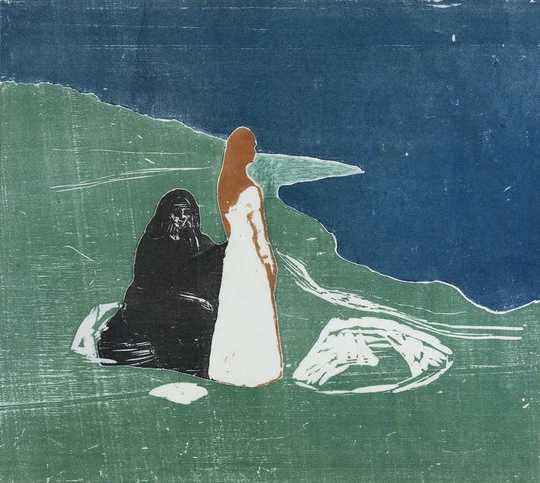
We come into this world, grow and flourish and then decay and die. Jakob Nilsson-Ehle/Flickr, CC BY
Fear of dying – or death anxiety – is often considered to be one of the most common fears. Interestingly though, neither of the two widely used diagnostic psychiatric manuals, DSM-5 or ICD-10, has a specific listing for death anxiety.
Death is related in the manuals to a number of anxiety disorders including specific phobias, social anxiety, panic disorder, agoraphobia, post-traumatic stress disorder and obsessive compulsive disorder. Although many psychologists will argue that these fears are proxies for the larger fear of death.
Existential therapy directly targets death and the meaning of life. It’s practised by psychiatrist Irvin Yalom, a pioneer in understanding fear of death and how to treat it in therapy. He has written a popular book on the subject called Staring at the Sun: Overcoming the Terror of Death. Existential therapy is one way of treating death anxiety but no matter what psychological approach is used, the underlying theme is generally the same: acceptance.
What’s so frightening about death?
All life has death in common, yet it’s striking how little we actually talk about it. In Western cultures at least, the concept can be too much even to consider. But from a clinical psychology perspective, the more we avoid a topic, situation, thought or emotion, the greater the fear of it can become and the more we want to avoid it. A vicious cycle.

Fear of the unknown is one of the specific fears around death. Jacob Surland/Flickr, CC BY
If presented with a client who has death anxiety, we would ask them to tell us exactly what they fear about death. Yalom once asked a client what bothered him most. The client replied, “The next five billion years with my absence.”
Yalom then asked, “Were you bothered by your absence during the last five billion years?”
The specific death fear will be different for everyone, but it can often be categorised into one of four areas: loss of self or someone else; loss of control; fear of the unknown – what will happen after death (nothingness, heaven, hell); and pain and suffering of dying.
Yalom suggests psychologists speak about death directly and early in therapy. The psychologist should find out when the client first became aware of death, who he discussed it with, how the adults in his life responded to his questions and whether his attitudes about death had changed over time.
Once we understand the client’s relationship to death, there are several approaches to help manage the associated anxiety. These include existential therapy, cognitive-behaviour therapy, acceptance and commitment therapy and compassion-focused therapy.
How to treat death anxiety
In one of the first studies to examine death anxiety directly, cognitive-behaviour therapy (CBT), was found to be successful in treating it in those suffering from hypochondria. The strategies used included exposure (going to a funeral), relaxation strategies (breathing) and creating flexible thoughts around death, such as recognising that fearing death is normal.
Some researchers argue that CBT should include strategies that explore the probability of life events – such as calculating the chances of your parents’ meeting and having you. Such techniques can shift our perspective from a negative fear of dying to a positive realisation we are lucky to experience life at all.
 We must learn to accept death. It’s not going away. from shutterstock.com
We must learn to accept death. It’s not going away. from shutterstock.com
Existential therapy has been shown very useful in treating death anxiety. It focuses on ultimate existential concerns such as isolation. For instance, we have a deep need to belong and having family and friends means, in some way, we live on after death.
Treatment is directed at finding meaning and purpose in life, increasing psychological and social support, building relationships with friends and family and improving coping skills to manage anxiety in daily life.
In compassion focused therapy (CFT), the client is encouraged to descend into the reality of human experience. That means realising we only have about 25,000 to 30,000 days of life. Suffering is normalised and the emphasis is on the fact that the trajectory of life is the same for everyone: we come into this world, grow and flourish and then decay and die.
CFT discusses how the human brain has the fantastic ability to imagine and question our very existence – as far as we know a uniquely human quality. We will then say to clients: “Did you design your brain to have that capacity?” Of course the answer is a resounding no.
So we work on the principle that it is not the client’s fault they have death anxiety but that we must work with our brains so they don’t paralyse our ability to live now.
In CFT we will sometimes use the phrase, “Our brains were designed for survival not happiness”. Strategies arising form this include guided discovery (slowing down and giving clients opportunities to make their own insights) and soothing rhythm breathing.
Although subtly different in approach these therapies have a similar underlying theme. Death is something we must learn to accept. The key for us in the context of death anxiety is how we get out of our minds and into our life.
Some tips that could help
 The human brain has a unique capacity to question its own existence. from shutterstock.com
The human brain has a unique capacity to question its own existence. from shutterstock.com
If you struggle with death anxiety, please consider seeing a psychologist. But for now, here are three tips that might be helpful.
- Normalise the experience: We have tricky brains that allow us to question our existence. This is not your fault but is how the human brain was designed. It is perfectly normal to have a fear of death; you are not alone in this struggle.
- Breathe: When you notice anxiety entering your body and mind, try to engage in some soothing breathing to help slow down your mind and physiological response.
- Write your own eulogy as if you’re looking back over a long life: Pretend it is your funeral and you have to give the eulogy. What would you write? What would you have wanted your life to be about? This might provide some meaning and purpose for how to live your life now.
About the Author
James Kirby, Research Fellow in Clinical Psychology, The University of Queensland
This article is republished from The Conversation under a Creative Commons license. Read the original article.
books_death
























